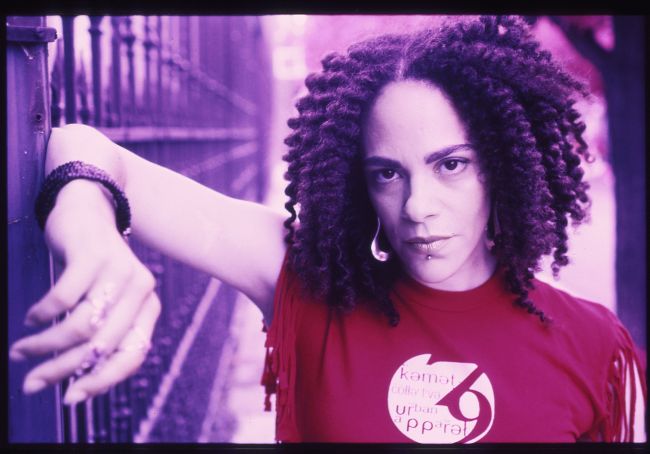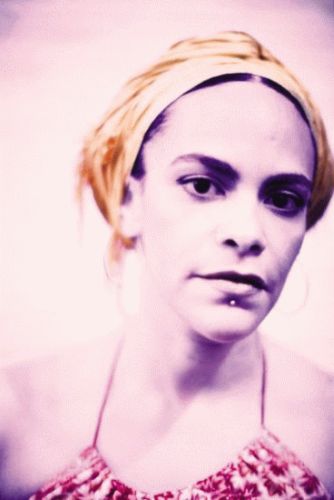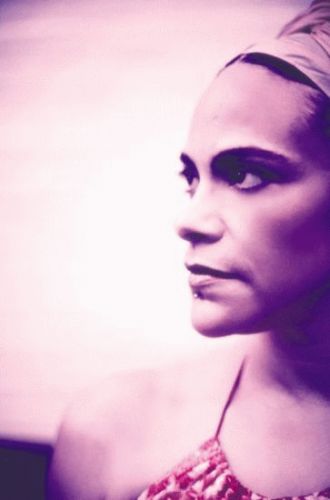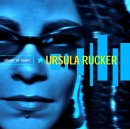
Ursula Rucker
2001
wurde ihr Debütalbum "Supa Sista" nicht nur von
Kritikern abgefeiert. Die einzigartige Art von Ursula Rucker
aus Philadelphia, auf den Wurzeln Hip Hop und Soul aufbauend
einen Stil zu entwickeln, der Poesie mit verschiedensten musikalischen
Einflüssen (Soul, Jazz, Hip Hop, Clubsounds - to name a
few) verbindet, wurde und wird von der Welt gebraucht. Ihre
Intelligenz und ihr Engagement, ohne ein Blatt vor dem Mund
selbstbewusst die Übel der Welt in ihren Alltäglichkeiten
anzuprangern, taten ihr Übriges. In der leider viel zu
klischeebehafteten Musik-Welt der Massen-Radio- und Fernsehstationen
bewegt sie sich abseits der Kisten - und bekämpft diese
zugleich. Dabei scheint es so, als ob ihre Spoken Word-Lyrics
immer dann an Wucht zunehmen, wenn ihre Stimme leiser wird.
Vergleichbar ist ihr Talkin'-Soul mit Gil Scott-Heron oder,
um bei den Frauen zu bleiben, mit der Dub Poetin Ranking Ann
und MC Soom T (Monkeytribe).
Mit "Silver Or Lead" liegt nun ihr neues Album bei
!K7 vor. Mit dabei sind Jazzanova (Berlin), The Mysterium, The
Roots, King Britt und andere Projekte aus Philadelphia sowie
4Hero (London) und Lil Louie Vega (New York). Ein Kaleidoskop
also mit verschiedenen musikalischen Facetten, deren Klammer
Ursula Rucker mit ihren Beobachtungen und Botschaften ist. Stephan
Oettel sprach mit ihr am 19.8.2003...
 When did you start to work on the album "Silver Or Lead"?
When did you start to work on the album "Silver Or Lead"?
Actually
just a few months ago. (laughs) we recorded the brand new tracks
that are on there in a relatively short period of time.
Being
a mother to three sons, where did you find time to record another
album?
This
album it was different because there are some previously recorded
tracks on here that were never released and some tracks that
have been released on other people´s projects, and then
the brand new songs. It is a nice mixture of brand new, kind
of new and old. That kinda afforded me time because there were
tracks that were already finished. So that was cool.
Which
tracks were already finished?
"Q&A"
was a song that was recorded for The Society's album which was
never released. "Lonely Can Be Sweet" and "Damned
If I Do" was for the Mysterium- project and that was never
released. "Soon" was on a compilation that I don't
think maybe three people heard. (laughs) No more people than
that but not many. It's a kind of obscure compilation. "What
A Woman Must Do" was supposed to be on my first album and
it didn't make it. So now I have it on this one. It's interesting
everything has a, some of the things have a former life and
now they have a new life. So, it's kinda cool.
The
main differences between "Supa Sista" and "Silver
Or Lead"?
Well,
I think it's a big difference. Just in so far that it wasn't
done in the same way. With "Supa Sista" everything
was recorded new. "Supa Sista" is a theme whereas
"Silver Or Lead" is a philosophy or a concept, so
all of these poems don't necessarily, there's not a theme, there's
not an overall theme. And there's more music. I think it's more
music than the first one. I think the first album was very minimal.
It was more sound than music. And I think this is more musical
than the first one.
What
comes first: lyrics or music? Do you already have the music
in mind when you write a poem or do you leave that up to your
producers?
It's
always different. Sometimes the poem has existed for ten years.
It's a poem that I had. And I want to put some music to it and
see what happens. Sometimes it's just a concept. And I ask for
a particular sound or a feeling and I get the track and then
the track helps me to get the words out. It happens all different
ways.
With
some of the producers on "Silver Or Lead", you have
worked with before. Who's new?
Yeah
- Louie Vega is the only person, isn't he? (laughs) Yeah Louie
Vega, and The Society. No, I had just met them when I did that
track with them. They are great people. Louie Vega is the brand
spanking new person that I worked with.
Are
you going to be on Louie Vega's upcoming new album?
His
album is already…. I did the intro to his album first and then
we did this one.
"Release"
is not a typical Ursula Rucker song in terms of the music. How
did it come about?
I
let Louie do his thing. He didn't even really tell me like what
kinda music it was gonna be. I kept asking him, what kinda music
are you doing, because you know I'm a virgo and I'm really particular,
I need to know (laughs). I didn't hear it until I went up there
that day to record it. It was like a real big surprise. And
it's all live music and it's great.
How
do you pick your producers?
They
have to have heart, you know, have a commitment to what they
are doing. Have respect for what I do. Really that is ultimately
important that they understand that I do poetry. That is the
most important thing here. Not that it's all about me, that's
not what I'm saying but it has to be about the poetry because
the words are so vital to what I do. I mean that is what I do.
Do
you think that people pay more attention to the music and producers
than to your poems?
I
think people forget that. When you do an album of poetry I think
people forget that this is poetry because you have the music
and there's a lot of stuff going on. You have to remind people.
You
are a graduate of Temple University's journalism department.
What impact does that have on your poetry?
Nothing,
because (laughs) I was studying advertising in school. I thought
I wanted to write ads. I thought that's how I was gonna be creative
with my writing. And I soon found out I was not interested in
that (laughs). So I'm happy for the experience. But I don't
wanna do that.
The
softer your voice gets the sharper your lyrics become. Take
"Return To Innocence Lost" as an example. Where is
the line between fiction and autobiographic stories?
I
would like to say it's fictional but it's not (laughs) because
that saves me from having to be so personal. But no, it's about
my brother.


How
do your poems come about?
You
know, they just do. It's hard to explain. It's hard to explain
something that you just do. Something that is so natural for
you. It's hard to analyze it and explain to people how you do
it and why you do it.
The
topics of your poems are everywhere around you, is it your own
experiences or stories that you are told by others?
You
know, everything. It's kinda like channelling, that's what I
say it is. It's like channelling other people's experiences,
their lives, my life, my experiences: things that make me angry,
injustices, all kinds of things. It could be anything. But ultimately
they become very personal.
You
are from Philadelphia. What impact does Philly have on your
music?
That's
always a hard question for me because I'm sure it does have
an impact on my music but it's not something that I give much
slot to. Because that's where I live, where I grew up, where
I was born, I don't really think about it too much. I love my
city and I wouldn't want to live any place else. So, I don't
really think about what effect it's had on my work or personhood.
I'm sure that it has but maybe someone on the outside could
answer that question better than me.
What
do you think about the Philly music scene?
I
mean, you know what, it's hard for me to answer that because
I'm not always in that scene. I am a mother, I'm at home with
my kids, I don't see those peoples as often as they see each
other. I'm not down at the studio hanging out. When I get to
see those people it's a happy occasion because it's not that
often. I have this other life, this real life that I live. I
don't ever really consider myself as part of a scene. I don't
think that way.
But
you get along with being associated with the Philly music scene?
Yeah,
because I like most of those people and I know most of them.
And they are really cool. They are really good people to know,
to work with, to have conversations with. So, I don't have any
problem being associated with people like that. (laughs) We're
from Philly. Philly is like one of the coolest places on the
planet. I'm sure I am biased but this is from other people who
come from other places and come there and say the same thing.
I feel that way about Berlin actually. I love Berlin, it has
that nice vibe, too.
What
gives you strength when times get rough?
Well
the poetry is what helps me in great deal, actually in getting
the thoughts and feelings out into the open for myself. If I
didn't write poetry, I would probably be beyond some serious
medication right now. (laughs) Probably be taking some kind
of anti-depresses or something like that, really honestly. So,
that is like my ultimate way of dealing with life; and spirituality,
prayer, faith. When it wavers though, which is often, the poetry
helps to snap me back.
What
about family?
Yeah,
my kids really remind me of what it is like to be innocent,
to be happy, to really enjoy life, to be whimsical and capricious.
It's nice to watch them and it's also extremely challenging
to raise them. So, it's a lot of things going on there. But
definitely, yeah, how could I forget that? Thank you. (laughs)
Please
describe yourself in three words.
Dramatic,
intense and really funny. (laughs)
What
artists do inspire you?
Well,
Frida Kahlo for one. Sonja Sanchez as a poet who lives in Philadelphia,
she is my favourite. Zora Neale Hurston, Giorgio Keef, Prince.
There's a few there.
Tell
us about the title of the album "Silver Or Lead".
"Plata
o plomo" - just a Mexican philosophy for life. It's just
about choice. What do you want out of life: silver or lead?
Just that simple! It struck me because it takes me so hard to
make a decision, so hard to make a choice, and to hear that
was kind of heavy for me, it hit me really hard, like yeah,
what do I want out of life? Do I want silver or lead? Why do
I make these choices and settle for the lead when I can have
silver? It's just that.
Do
you have a favourite song on the new album?
It's
hard to pick a favourite. I would say "Time" because
it's a prayer that I wrote. When I hear it, it feels like it's
not me speaking. I think that I really was somewhere else when
I wrote that. I mean, I go to other places all the time when
I write but this place that I was in when I wrote "Time"
was like, I don't know. I think that's one of my favourites.
And the music is like spectacular.
What
do you want to give your audience with your poems and music?
I
want to give the gift of art and all its possibilities for making
you think, making you travel in your mind, making you kind of
stimulating your imagination. All the ways that you can really
merge different arts together like the words with the music
and just how wonderful it is. Art is so important. And it's
not just beautiful to look at or listen to, it's really applicable
to a lot of things in life.
Your
albums should wear a sticker warning "Explicit Lyrics".
Your lyrics are so open and honest, more than many of the so-called
"explicit lyrics" in hip hop.
I
agree with you, I don't know why it hasn't have them on there.
(laughs) Because whenever I would give "Supa Sista"
to someone who wasn't familiar with what I did I always have
to tell them, now listen, if you have children, I think you
should listen to this first and see how you feel about it. If
you want your children to listen to it, that's your decision
but I wouldn't just play it. Or if you are hypersensitive to
certain words and certain issues then don't listen to this album
at all.
You
criticise the clichés and stereotypes in hip hop, the
way women are objectified…
And
I will continue to do so. (laughs)
… because it is getting worse?
Oh
yeah, it's getting worse, still. I get a lot of criticism for
talking about that, for some reason. I don't know why.
Who
criticises you?
Journalists.
It's covert criticism, like they ask me a certain question and
I hear it as a kind of like, I don't know, like an attack on
talking about these things. Sometimes it feels like I'm not
allowed to say this stuff or something. But yeah, these people
who make this terrible rap music are allowed to continue doing
that, but I'm not allowed to say what I feel about it. That's
kinda strange to me. It feels an uncomfortable feeling. But
I'm still gonna do it. If I have at least one poem on every
album that I do will be about that as long as it exists. I feel
very strongly about this. I'm a child of the hip hop movement.
It hits very close to home.
What
can be done when kids are so susceptible to the "bling-bling"-stereotypes
in hip hop?
Introduce
them to something else. Give them other options, other choices.
That's what "Silver or Lead" is: choice. I think that's
the main problem here is that people don't know what else is
out there. All they know is the mainstream. Mainstream is so
much of a monster that people don't even look any place else
because everything is given to them. They get everything from
this mega-monster mainstream thing. So, you have to introduce
people to other things. If they don't know about it then why
would they choose it? I find that people who have come to my
performances or been given my album and didn't know anything
about me, didn't care about poetry or anything like this. Many
have been turned on to it and really appreciate it and really
get into it. And they never had any interest in it at all. They
come and say to me, wow, I'm glad that somebody introduced me
to this, because I would have never known. And that right there
tells me that it would work if we gave people more options.
But that's an individual process like me, you, we have to go
out and tell people about alternative music, art, poetry, film.
They have to know that they can go to their little art-houses
to see a film with sub-titles and that could be just as cool
as seeing Hollywood mega blockbuster, probably cooler. They
may have to work a little harder, read the subtitles, but it's
ok. (laughs) It's have people keep doing different things. Break
them out of their ritual.
How
do you raise your kids?
Yeah,
mhm (laughs), my oldest son is eight, and we listen to things
together. I actually have some guilty pleasures and Snoop Dog
happens to be one of them (laughs). I do like Snoop Dog. I like
a lot of his stuff. I like his poetry, I like audacity. I do
not like his objectification of women and his nastiness. I'm
always between a rock and hard place with him. And I explain
to my son, look, this is cool but that's not. And this is why.
You have to like balance things out. I let him listen to things.
And then I will tell him he's not allowed to listen to it anymore
because I want him to know. I want him to listen to it and we
talk about it, ok, why is this not cool. I don't want you singing
this around the house, because you know nothing about it. Say
for instance, like the 50 Cent-lyric: "Gonna drink Bacardi,
like it's your birthday". When my son would say this, I'd
be like "You are not drinking Bacardi". You are not
drinking Bacardi. You don't even know what it is. You haven't
tasted it yet. You know nothing about it. And I don't want you
singing it. It doesn't sound right. The picture is wrong for
an eight-year-old to say. And that's tame, drinking Bacardi
in the videos. We don't even watch videos anymore, really, every
once in a while. Cause it's just too much for me. I remember
when videos first started they used to be so exciting cause
everybody was being creative and you were like, wow, what are
they going to do next. They were like little short films. Now
it's just sex everywhere and everybody's acting crazy, they
are always on a beach somewhere, by a pool, it's just insane.
I saw this video in Paris, I'm sorry I'm being long-winding,
saw this video in Paris, this American artist called Chingy.
I had never heard of him, never saw this video. My mouth dropped
open. I couldn't believe it. I was like, this is a soft-porn
video, what the hell is this. I couldn't believe all the ass
in that video, it was insane. Then somebody was coming to pick
me up down in the lobby of the hotel. And I had just seen that
video. I was like in shock. I came down on the elevator, like
what the hell has just happened. Really it threw me for a loop,
I couldn't believe it. I was like, they not gonna show this
in America first of all and if they do…. This was an uncensored
video. And I was like, wow, you know what it really hit me because
this is in Paris and these people are watching this and they
are judging black people in America based on this video. And
that pissed me off. See that is why I talk about this stuff.
So don't tell me I can't talk about this shit. When I watch
videos like that, Chingy doesn't realize what he has done with
that video. He's like, oh, cool, I have all these bitches up
in here with their asses hanging out and it's just cool. He
doesn't realize the impact that that has and how people who
don't know about us and our experience use things like that
for their reference. And how young people look at that and want
that and how women… (shakes her head)
Is it a matter of knowledge?
Well,
in America anyway there's a trend towards dumbing down. Not
many people read books. They look towards the television for
all their information. They don't have to go find it on their
own. The funding for art is been taken away in schools. There
is a miseducation going on, on a mass scale. People are turning
to these outlets like videos and TV shows and CNN for all their
information. They don't know anything else. That's dangerous,
black people in America being told who they are from these videos
and how to act and how to be and what to want out of life. It's
ridiculous.
Is
Hip Hop still "black man's CNN" as Chuck D from Public
Enemy once said?
Man,
CNN is fucked up enough. So if Hip Hop is the CNN of black community
(laughs) then it's messed up (laughs). It's messed up. We have
to do something about it. I don't care if people get mad at
me for saying it. We have to do something. I know a lot of people
who do, you know, who fight to make changes and care about this,
activists. A lot of people who are on the front line are really
trying to save our community, our young people. Give them some
pride because shaking your ass around in videos is really nothing
to be proud of.
You
wear a T-Shirt with a photo of Angela Davis on it…
Yeah,
I don't think she would do that. (laughs) I would love to talk
to her about what she thinks about all of this. It's so complicated,
it's so complex. I would love to sit down and talk to her, somebody
who really made it possible actually for… She's one of the major
voices that made it possible for black people to even be able
to do hip hop. If it wasn't for people like her we wouldn't
even be able to do that. People who were brave and came forward
and fought for rights and were fearless. It's not just young
people, these are adults who are making this music, too. They
don't give any thought to that. They don't give any thought
to the forebears and the sacrifices that were made for them
to be able to do what they do. They just throw the responsibility
right out of the window. And just cash their cheques. Buy their
fat rides. That's it.
But that's only one part of hip hop. What about people like
Common and The Roots?
Yeah,
but unfortunately they are exceptions now. Common and The Roots,
Talib Kweli they are all in this little special category over
here. The major attention is given to the glamour, the rap not
hip hop. Rap music which is not hip hop! People like The Roots
and Common, Bahamadia they all live hip hop. They are part of
the movement. They are dedicated to this way of life. Not just
for the art of it but for the politics of it, for the culture
of it, the changes that you can make via this movement. A movement
is pretty big stuff. A music category is just a little tiny
thing. And that's what these people are. They are part of a
music-category, they are not part of a movement. I just don't
get it. Really don't. And I won't.
Who
do you bring with for your concerts in Germany in November?
I'm
going to bring my guitarist Tim Motzer that I always perform
with. Usually it's just me and him. But with this album since
it's more musical I need some more musicians, so I'm looking
for a percussionist now. That's what it will be: me, a guitarist
and a percussionist and some couple of little machines there.
Interview: Stephan Oettel (8/03)
Einleitung:
Karsten Frehe

Lyrics:
"What
A Woman Must Do"
www.k7.com